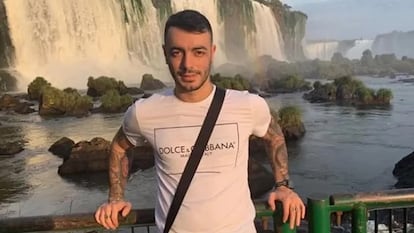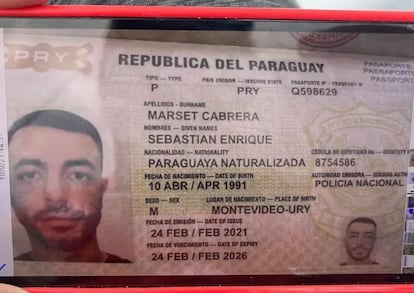Political scandal rocks Uruguay after passport issued to ‘dangerous and influential’ drug trafficker
The Uruguayan Prosecutor’s Office has summoned several senior officials to testify over issuance of the documentation to Sebastián Marset, who is a suspect in the murder of Paraguayan prosecutor Marcelo Pecci

The days when Uruguayans needed to turn to digital platforms to get their fix of melodramas about drug traffickers and organized crime are long gone. Defined by authorities in Montevideo as a “dangerous and influential” drug trafficker, 32-year-old Sebastián Marset is in the news almost daily in Uruguay, rattling society with a rap sheet linking him to the First Uruguayan Cartel and to a series of crimes committed across international borders. Among these, Marset is cited as the alleged leader of a network dedicated to drug trafficking in Paraguay and his name has also been associated with the murder of Paraguayan anti-drug prosecutor Marcelo Pecci in Colombia in May 2022.
Colombian President Gustavo Petro unequivocally singled out Marset as the perpetrator of that crime in August, 2022. “The investigation into the murder of Paraguayan prosecutor Marcelo Pecci by Uruguayan drug trafficker Marset in Colombian territory shows that drug trafficking has long since ceased to be a bilateral Colombian-U.S. problem and is now an American and global problem,” Petro wrote on Twitter.
While Colombia continues to investigate Pecci’s death, Paraguay is following leads as to the whereabouts of Marset, a fugitive from justice after obtaining a Uruguayan passport while in a Dubai prison. At the same time, the Uruguayan Prosecutor’s Office is conducting a criminal investigation into how Marset was able to obtain the passport under such circumstances. In August, the heads of the Interior and Foreign Ministries will appear in court over the matter, in addition to 11 other people involved in the issuance of the document.

“I don’t know where the doubt lies; the legislation is very clear,” Uruguayan Interior Minister Luis A. Heber told the press when asked in August 2022 about the passport in question. According to official information, Marset processed it while imprisoned in Dubai, where he had been detained in September 2021 for traveling on forged Paraguayan documentation. The issuance process, which involved the participation of several officials and the offices of Marset’s lawyer in Uruguay, was carried out in accordance with the regulations in force, as stated by the authorities.
With his fake passport in hand, Marset was released in February 2022. He managed to evade an international arrest warrant issued a month later by Interpol after disappearing without trace. Tracking him down does not seem to be an easy task, given the Uruguayan’s chameleon-like career, which in addition to involvement in drug trafficking networks has also involved spells in soccer and show business, especially in Paraguay, to where he relocated after serving a prison sentence in Uruguay.
In 2013, at the age of 21, Marset was prosecuted in Montevideo for three drug trafficking offenses. He admitted to being the recipient of 450 kg of marijuana seized in Operation Wayra, a joint operation coordinated between Uruguay and Paraguay. He was released in 2018 and left the country after being tried without a conviction for homicide. He passed through Bolivia and arrived in Paraguay, where he was listed as a music producer and professional soccer player, activities that he is suspected of using to launder money. In 2021, he left Paraguay and tried to reach Turkey but was arrested in Dubai.
In the framework of a massive anti-drug operation in Paraguay in February 2022, Marset was accused of being one of the leaders of an organization dedicated to trafficking cocaine in containers traveling from Paraguay to Europe. As a result of the operation, in which Pecci played a leading role, Marset has been identified as the organizer of a shipment of 16 tons of cocaine destined for Europe.

Political turmoil in Uruguay
In Uruguay, the Interpol warrant against Marset caused a political furor. In March 2022, legislators of the opposition center-left Frente Amplio requested information from the Ministries of the Interior and Foreign Affairs regarding the process that led to the issuance of Marset’s passport. Following this request, a parliamentary interpellation to the heads of these ministries took place in August 2022, which resulted in the Prosecutor’s Office electing to initiate a criminal investigation.
According to reports, the prosecutor for Economic Crimes, Alejandro Machado, will summon the Minister of Foreign Affairs, Francisco Bustillo, and the Minister of the Interior, Luis A. Heber, to testify next month.
So far, both officials have maintained that the issuance of Marset’s passport was carried out in strict compliance with current legislation. During the interpellation, Heber pointed out that the 2014 decree regarding the issuance of passports only requires that authorities take into account judicial records and open criminal cases in Uruguay to grant one. “All of Mr. Marset’s cases were archived and closed in 2020″, Heber remarked, noting that the passport was processed at the end of 2021.
Senator Mario Bergara of the Frente Amplio, however, stated that the authorities should have assumed their political responsibility instead of offering “mere administrative and bureaucratic arguments.”
In August, Prosecutor Machado will also summon the current Vice Minister of the Interior, Guillermo Maciel, as well as the former Vice Chancellor, Carolina Ache, who resigned from her position in December 2022 after the political earthquake generated by the delivery of the passport to Marset.
In the parliamentary interpellation last August, Ache stated she was unaware of Marset’s background. However, the publication of a conversation between her and Maciel showed that both were aware of his criminal activities. In a written message from Maciel to Ache, published in ladiaria, the former states: “We should find out what happened with this criminal arrested in Dubai over fake documents. He is a dangerous and influential narco.” The WhatsApp message was sent in November 2021, two months before Marset received his passport in January 2022.
With this exchange having come to light and questions unanswered, the Prosecutor’s Office is moving forward with the investigation. Meanwhile, there is growing concern about the incidence of drug trafficking in Uruguay, once only seen from afar in exotic television series.
Sign up for our weekly newsletter to get more English-language news coverage from EL PAÍS USA Edition
Tu suscripción se está usando en otro dispositivo
¿Quieres añadir otro usuario a tu suscripción?
Si continúas leyendo en este dispositivo, no se podrá leer en el otro.
FlechaTu suscripción se está usando en otro dispositivo y solo puedes acceder a EL PAÍS desde un dispositivo a la vez.
Si quieres compartir tu cuenta, cambia tu suscripción a la modalidad Premium, así podrás añadir otro usuario. Cada uno accederá con su propia cuenta de email, lo que os permitirá personalizar vuestra experiencia en EL PAÍS.
¿Tienes una suscripción de empresa? Accede aquí para contratar más cuentas.
En el caso de no saber quién está usando tu cuenta, te recomendamos cambiar tu contraseña aquí.
Si decides continuar compartiendo tu cuenta, este mensaje se mostrará en tu dispositivo y en el de la otra persona que está usando tu cuenta de forma indefinida, afectando a tu experiencia de lectura. Puedes consultar aquí los términos y condiciones de la suscripción digital.








































